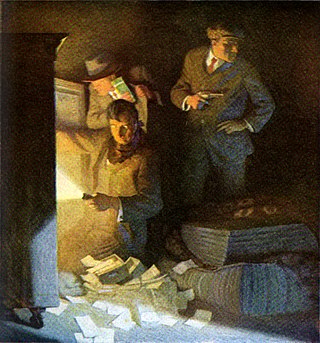
Boston Blackie is a fictional character created by author Jack Boyle (1881–1928). Blackie, a jewel thief and safecracker in Boyle's stories, became a detective in adaptations for films, radio and television—an "enemy to those who make him an enemy, friend to those who have no friend."
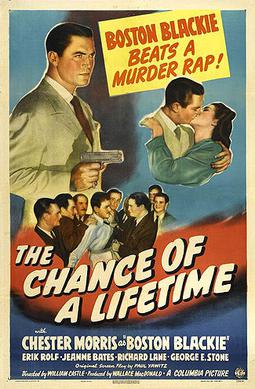
The Chance of a Lifetime is a 1943 crime drama starring Chester Morris, Erik Rolf and Jeanne Bates. It is one of 14 films made by Columbia Pictures involving detective Boston Blackie, a criminal-turned-crime solver. This was the sixth in the series and one of three that did not have his name in the title. The film is also William Castle's directorial debut. As with many of the films of the period, this was a flag waver to support America's efforts during World War II.

Richard Lane, sometimes known as Dick Lane, was an American actor and television announcer/presenter. In movies, he played assured, fast-talking slickers: usually press agents, policemen and detectives, sometimes swindlers and frauds. He is perhaps best known to movie fans as "Inspector Farraday" in the Boston Blackie mystery-comedies. Lane also played Faraday in the first radio version of Boston Blackie, which ran on NBC from June 23, 1944 to September 15, 1944. Lane was an early arrival on television, first as a news reporter and then as a sports announcer, broadcasting wrestling and roller derby shows on KTLA-TV, mainly from the Olympic Auditorium in Los Angeles.

George E. Stone was a Polish-born American character actor in films, radio, and television.

Francis Thomas Sullivan, known professionally as Frank Sully, was an American film actor. He appeared in over 240 films between 1934 and 1968. Today's audiences know him best as the dumb detective in the Boston Blackie features, and as the foil in many Three Stooges comedies.

Meet Boston Blackie is a 1941 American mystery crime film directed by Robert Florey starring Chester Morris, Rochelle Hudson, Richard Lane. Morris plays Boston Blackie, a notorious, but honorable jewel thief. Although the character had been the hero of a number of silent films, this was the first talking picture. It proved popular enough for Columbia Pictures to produce a total of fourteen B movies, all starring Morris. The next film in the sequence was Confessions of Boston Blackie.

Confessions of Boston Blackie is a 1941 American mystery crime film directed by Edward Dmytryk and starring Chester Morris, Harriet Hilliard and Richard Lane. A woman consigns a family heirloom to a pair of unscrupulous art dealers in order to raise money to help her sick brother. This film is the second in the series of 14 Columbia Pictures Boston Blackie films, all starring Morris as the reformed crook. It was preceded by Meet Boston Blackie (1941) and followed by Alias Boston Blackie (1942).
Boston Blackie Goes Hollywood is a 1942 American crime film, fourth of the fourteen Boston Blackie films of the 1940s Columbia's series of B pictures based on Jack Boyle's pulp-fiction character.

Alias Boston Blackie (1942) is the third in a series of fourteen Columbia Pictures "B" movies starring Chester Morris as Boston Blackie. It was preceded by Meet Boston Blackie, Confessions of Boston Blackie and followed by Boston Blackie Goes Hollywood. Once again, Blackie is suspected of committing a crime, in this instance of helping a prisoner escape.

After Midnight with Boston Blackie is a 1943 crime film directed by Lew Landers. It is the fifth of a series of 14 Columbia Pictures films starring Chester Morris as Boston Blackie. When a recently paroled friend of Boston Blackie is killed, he finds himself once again the prime suspect of Police Inspector Farraday.
One Mysterious Night is a 1944 crime film, the seventh in a Columbia Pictures series of fourteen starring Chester Morris as reformed crook Boston Blackie. It was preceded by The Chance of a Lifetime and followed by Boston Blackie Booked on Suspicion. Blackie is called upon to recover a stolen diamond.
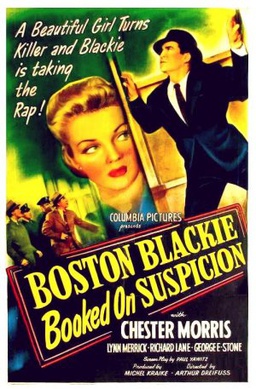
Boston Blackie Booked on Suspicion is the eighth of 14 Columbia Pictures B movies starring Chester Morris as reformed thief Boston Blackie.
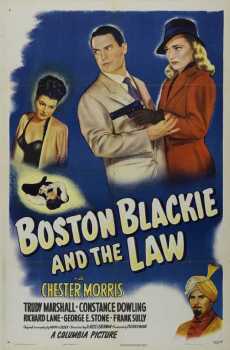
Boston Blackie and the Law is the twelfth of fourteen Columbia Pictures films starring Chester Morris as reformed crook Boston Blackie.

A Close Call for Boston Blackie is a 1946 American crime film directed by Lew Landers. It is the 10th of 14 Columbia Pictures films starring Chester Morris as Boston Blackie.
Seymour Friedman was an American film director. He later worked as a production manager in television. Friedman began his career as an assistant director, before enlisting for military service following America's entry into World War II. He directed his first film, Trapped by Boston Blackie, in 1948. Like many of the other films he directed, it was a low-budget series film. In the early 1950s, Friedman went to Britain to make a couple of films, before returning to Hollywood. He directed his last film in 1956, and switched to working entirely in television.
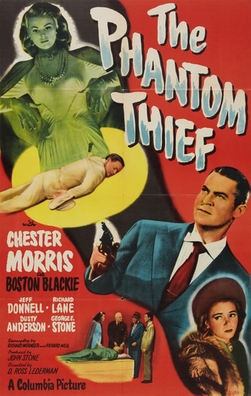
The Phantom Thief is a 1946 American mystery crime film directed by D. Ross Lederman and starring Chester Morris, Jeff Donnell and Richard Lane. It was produced and distributed by Columbia Pictures as part of the Boston Blackie series.
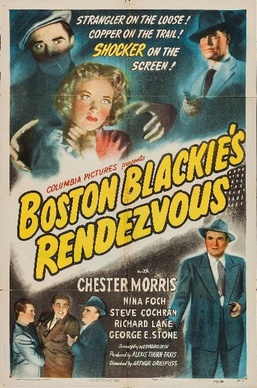
Boston Blackie's Rendezvous is a 1945 American crime film directed by Arthur Dreifuss. The working title of this film was Surprise in the Night.

Trapped by Boston Blackie is a 1948 American crime drama directed by Seymour Friedman. It is the thirteenth of fourteen Columbia Pictures films starring Chester Morris as reformed crook Boston Blackie, and the final film with George E. Stone as his sidekick, "The Runt".
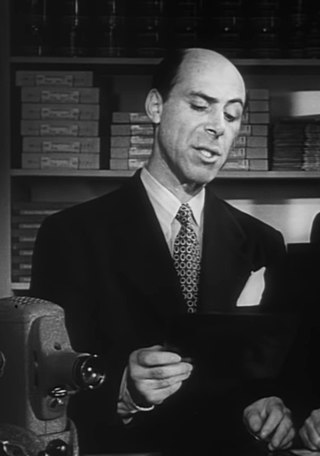
Sid Tomack was an American actor. He appeared in films and on television.
Boston Blackie is an American old-time radio detective drama. It was broadcast on NBC June 23, 1944 – September 15, 1944, and later was syndicated.
















